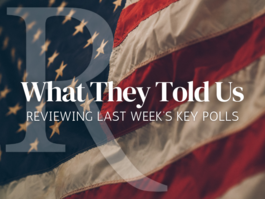Military Wants Concealed Carry Rights on Stateside Bases
America’s military risk their lives to defend this country, but now they want a better chance to defend themselves, too.

America’s military risk their lives to defend this country, but now they want a better chance to defend themselves, too.

You don't have to wander long in the liberal commentariat to find projections that the Republican Party is in a death spiral, doomed by demographics, discredited by the dissension among House Republicans, disenchanted with its experienced presidential candidates and despised by the great mass of voters.

Dr. Ben Carson's whole life has been very unusual, so perhaps we should not be surprised to see the latest twist -- the media going ballistic over discrepancies in a few things he said.

Americans still firmly believe the war on drugs has been a failure, and few think more money will make a difference.

Twenty-seven percent (27%) of Likely U.S. Voters think the country is heading in the right direction, according to a new Rasmussen Reports national telephone survey for the week ending November 5.

Americans are more convinced that their local housing market is good for sellers, although homeowners’ expectations for their own home values have stayed about the same.

Most voters continue to believe the federal government is not interested in stopping illegal immigration, and support for state rather than federal enforcement of immigration laws is now at its highest level in several years.

Police unions are out of control.

No matter what some elected officials tell them, Americans just aren’t buying the need for a lot more gun control.

It still looks like a “Donald” world as far as most Republican voters are concerned.
The latest Rasmussen Reports weekly Trump Change survey finds that 64% of Likely Republican Voters think Donald Trump is likely to be the GOP presidential nominee next year, but 33% still consider that outcome unlikely. This includes 19% who say a Trump nomination is Very Likely and 10% who consider it Not At All Likely. (To see survey question wording, click here.)

Here we go again: another liberal narrative burned to a crisp.

The U.S. Department of Education on Monday criticized a suburban Chicago school district for not allowing transgender students access to girls' locker rooms and restrooms, but voters in Houston a day later repealed a law barring discrimination against transgender individuals in large part because of concerns that the law would allow men claiming to be women to use women's bathrooms.

'Shut up,' he explained. That's a sentence from Ring Lardner's short story "The Young Immigrunts." It's an exasperated father's response from the driver's seat to his child's question, "Are you lost, Daddy?"

Heroin abuse is now the number one drug threat in the country, according to the Drug Enforcement Administration, and Americans say it’s affecting their communities.

Voter confidence in the Obama administration’s fight against the radical Islamic group ISIS is down despite the president’s decision to send a small number of troops to Syria, perhaps because voters strongly suspect that more will soon be on the way.

The UVA Center for Politics’ latest documentary, Ball of Confusion, has begun airing on PBS stations across the nation this week. Check your local listings to see when it’s playing in your area, and click on the image below to watch the trailer. The documentary recounts the three-way presidential contest among Richard Nixon, Hubert Humphrey, and George Wallace held against the backdrop of the Vietnam War and civil unrest at home. That election, decided 47 years ago today, remains amongst the most extraordinary in American history, as Larry J. Sabato writes below.
— The Editors

Support for the current federal system of background checks on gun purchasers remains high, but voters still question their effectiveness in reducing crime. One-in-three voters, however, want to expand the list of people who can be denied a gun.

When was the last time you heard a sitting politician give a speech that made you stop and think? A speech where you actually learned something?
When was the last time you heard a vicious excoriation of Washington and Congress and the whole federal government, yet saw the first glimmer of hope that perhaps all is not already completely lost?

Ohio voters yesterday rejected by nearly a two-to-one margin a ballot initiative that would have legalized both medical and recreational marijuana, but mixing the two into one vote may have been supporters’ biggest mistake.

We love to complain about elites, people who seem to have a special advantage, privileges in life.